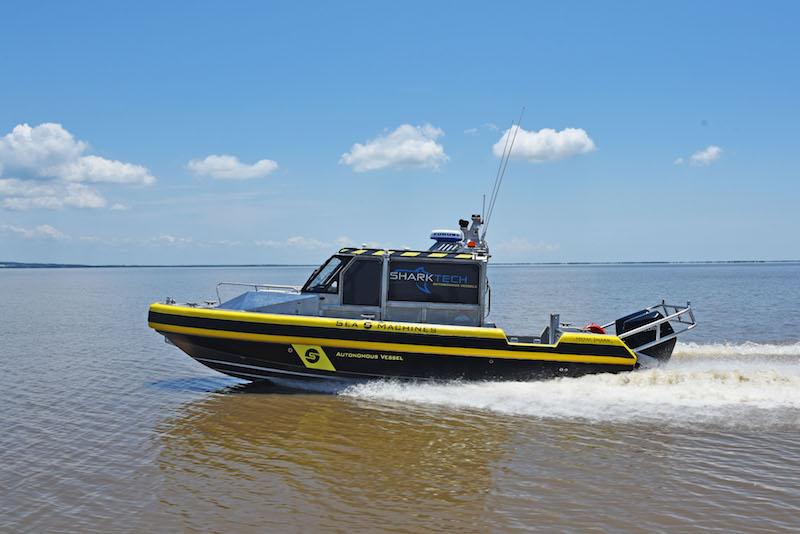U.S. boatbuilder Metal Shark brought a 38' Defiant patrol boat to the Multi-Agency Craft Conference last year in Baltimore. Along with its partner ASV Global, what set the team’s SharkTech patrol boat apart from the others was that it was an autonomous vessel.
These autonomous vessels can be custom configured for military, law enforcement, fire rescue, and other commercial markets.
At the time, Chris Allard, Metal Shark’s CEO, said, “The industry has watched and waited as autonomous technology has matured from its fledgling stages. We are demystifying and streamlining the process of autonomous technology integration by bringing this capability to market in turnkey form straight from the OEM (original equipment manufacturer).”
Beyond simple waypoint navigation or the execution of pre-programmed mission routes, Sharktech’s ASView onboard digital control system features a collision avoidance system with decision-making capability. The system allows for autonomous or remote operation of navigation and safety lighting, hailers and sirens, pumps, and other components.
It also permits the integration and autonomous or remote operation of a near-infinite range of specialized equipment, including fire pumps, monitors, and other firefighting equipment; hydrographic survey equipment; equipment for acoustic, oceanographic, or meteorological monitoring; and the full spectrum of FLIRs and other specialty cameras.
NEXT STEP
Recently, Metal Shark partnered with Sea Machines, a Boston-based developer of autonomous marine technology, to introduce a new 29' Sharktech autonomous vessel.
The new Sharktech 29 Defiant welded aluminum monohull pilothouse vessel features original OEM-integrated Sea Machines technology that offers a full range of advanced capabilities including active control and collision avoidance. The system allows for either traditionally manned, reduced crew or unmanned autonomous operations.
The two companies recently began demonstrations using the new platform, and units are now available for acquisition by government and commercial operators under Metal Shark’s stock boat program.
“This relationship came about earnestly because Sea Machines and Metal Shark share the mutual goal of bringing advanced autonomous marine technology to the market now,” said Don Black, Sea Machines vice president, sales and marketing. “One of the reasons Metal Shark chose to work with us was because we are one of the few companies that has autonomous marine systems commercially and readily available — meaning we have systems in stock, ready for installation on all types of workboats and a variety of commercial and government vessels now.”
Autonomous vessels are certainly of interest to naval officials who have been looking for ways to keep personnel safer during drug interdiction operations and in war zones. The Sea Machines-Metal Shark autonomous surface vessel package was developed using the SM300 vessel intelligence system that provides “operator-in-the loop” autonomous command and control, plus direct remote-control operation via wireless belt pack. “This system is configured for over-the-horizon detection as it pertains to collision avoidance, using radar and AIS sensors,” said Black.
Other features of the system include:
• Autonomous command for more productive, predictable and safer marine operations;
• Remote-helm control for faster responses and reduced operational costs;
• Remote payload control for on-board equipment cameras, sensors and more;
• Collaborative operations for a force-multiplier effect;
• Overall reduced manual effort that allows human operators to focus on higher-level tasks.
• Advanced mission planning and situational awareness capabilities round out the autonomous package. Routine software updates allow for system enhancements as additional refinements are made.
Black said the Sea Machines system can increase the productivity, predictability and safety of marine operations while helping to reduce incidents related to fatigue, poor visibility and challenging environments. “In terms of lowering risk and operational cost, unmanned operations can reduce stop-work periods and eliminate shift changes, which further increases productivity and safety,” he said.
The Sea Machines technology suite is designed to integrate into a versatile, military-proven hull form. Powered by twin outboard engines, the vessel has top speeds over 45 knots. The 29 Defiant can be customized to meet unique mission requirements. However, to reduce lead times, a standardized configuration has been developed for the stock boats program.
Yet the autonomous vessel is not just for military operations. “Sea Machines and Metal Shark are well matched for municipality, county, or state agency operations, including patrol, security, environmental protection applications and more,” Black said.
Allard will discuss autonomous technology with Sea Machines founder and CEO Michael Johnson at the International WorkBoat Show on Thursday, Dec. 5, at 1 p.m.




